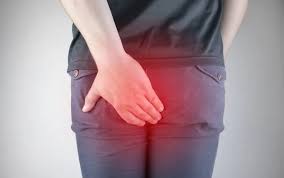Diagnosing Anal Itching
Initial Assessment
Your healthcare provider will start by inquiring about symptoms, medical history, and personal habits to identify the cause of anal itching. A physical examination, which may include a rectal exam, is often necessary. If a pinworm infection is suspected, a specific test may be conducted.
Specialist Referral
In cases where the cause is not apparent or if standard treatments fail, you may be referred to a dermatologist—a specialist in skin conditions. Even if the exact cause remains elusive, they can still treat the symptoms effectively.
Treatment Options
Tailored Treatments
The treatment for anal itching varies depending on the underlying issue. It may involve self-care measures, such as applying anti-itch creams or addressing infections or fecal incontinence.
Medications
For nighttime symptoms, an oral antihistamine may be prescribed to provide relief until an anti-itch cream becomes effective.
Consistent Care
With the right approach, most individuals find relief from anal itching. Consult your healthcare provider if the condition persists.
Lifestyle and Home Remedies
Preventive Measures
To prevent anal itching, maintain a clean, cool, and dry anal area without causing skin irritation.
Self-Care Steps
If you’re experiencing anal itching, consider the following:
- Gentle Cleansing: After bowel movements or when soiled, clean the area with a shower, bidet, sitz bath, or squeeze bottle. Use moist toilet tissue and avoid harsh scrubbing. Pat dry or use a hair dryer on a cool setting.
- Avoid Scratching: Scratching only offers temporary relief and can worsen irritation. Use a moist compress or take a lukewarm oatmeal bath for relief. Keep nails short and consider wearing cotton gloves at night.
- Appropriate Underwear: Choose white cotton underwear that doesn’t bind to keep the area dry. Avoid tight garments that trap moisture.
- Steer Clear of Irritants: Stay away from bubble baths, scented products, and harsh soaps. Gentle soap and water are best.
- Dietary Adjustments: Reduce intake of tea, coffee, cola, alcohol, citrus fruits, pepper, dairy, spicy foods, tomato sauce, and tomatoes. Limit laxative use.
- Protective Applications: Use a thin layer of zinc oxide ointment or petroleum jelly to shield the skin. Apply hydrocortisone 1% cream if needed for inflammation and itching.
- Fiber-Rich Diet: Increase your intake of vegetables, whole grains, and noncitrus fruits for regular bowel movements. Beans, nuts, seeds, and fiber supplements like psyllium and methylcellulose can also be beneficial.
Preparing for Your Medical Consultation
Understanding When to Seek Medical Advice
While anal itching is often not a cause for concern, persistent symptoms after self-care warrant a visit to a healthcare provider. You may be referred to a dermatologist or a proctologist for specialized care.
Pre-Appointment Checklist
To prepare for your appointment, compile a list of:
- Symptoms: Note all symptoms, even those that may not seem related to anal itching.
- Duration: Record how long you’ve been experiencing these symptoms.
- Medications: List all medications, vitamins, and supplements you’re taking, along with their dosages.
Questions for Your Healthcare Provider
Inquiries to Make
When meeting with your care provider, consider asking:
- What could be the most likely cause of my symptoms?
- Are there any tests that I need?
- Is this condition temporary?
- What treatment options are available, and which do you recommend?
- Is there a need to consult a specialist?
- Can you provide any brochures or recommend websites for more information?
Expectations During the Appointment
Possible Questions from Your Doctor
Your healthcare provider may inquire about:
- The consistency of your symptoms.
- The severity of your symptoms.
- Any recent changes in bowel movements.
- The products you use on your body.
- Anything that improves or worsens your symptoms.
- Any other health changes you’ve noticed.
- If others in your household are experiencing similar symptoms.
Interim Measures
Steps to Take Before Your Appointment
In the meantime, you can:
- Gently cleanse the anal area after bowel movements.
- Dry thoroughly and wear cotton underwear and loose clothing.
- Avoid scratching to prevent further irritation.
| Section | Key Points |
|---|---|
| Understanding Anal Itching | – Common condition known as pruritus ani<br>- Causes: infections, hemorrhoids, diarrhea, dermatitis<br>- Treatment leads to complete relief |
| Symptoms and Signs | – Intense itching, inflammation, burning, soreness<br>- Symptoms may worsen at night or in humid weather |
| When to Consult a Doctor | – Severe or constant itching<br>- Anal bleeding or stool leakage<br>- Infection or unknown cause of itch |
| Potential Causes | – Irritants: fecal incontinence, harsh soaps, excessive wiping<br>- Infections: STIs, pinworms, yeast infections<br>- Skin conditions: dry skin, psoriasis, contact dermatitis<br>- Other conditions: diabetes, thyroid disease, hemorrhoids |
| Diagnosing Anal Itching | – Diagnosis through symptoms, medical history, physical exam<br>- Possible test for pinworms<br>- Referral to dermatologist if cause is unclear |
| Treatment Options | – Depends on the cause<br>- Self-care measures, anti-itch creams, treating infections<br>- Oral antihistamines for nighttime symptoms |
| Lifestyle and Home Remedies | – Keep the area clean, cool, and dry<br>- Gentle cleansing, avoid scratching<br>- Wear cotton underwear, avoid irritants<br>- Dietary adjustments, protective applications, fiber-rich diet |
| Preparing for Your Medical Consultation | – Seek medical advice if symptoms persist<br>- Make a list of symptoms, duration, medications<br>- Questions for healthcare provider |
| Questions for Your Healthcare Provider | – Likely cause of symptoms, necessary tests, condition temporality<br>- Treatment options, need for specialist, informational resources |
| Expectations During the Appointment | – Questions about symptom consistency, severity, changes in bowel movements<br>- Products used, symptom triggers, general health changes, similar household symptoms |
| Interim Measures | – Gently cleanse and dry the anal area after bowel movements<br>- Wear cotton underwear, loose clothing, avoid scratching |


